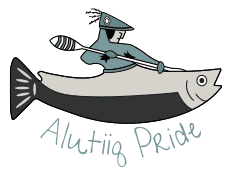MARINE MAMMAL
PROGRAM
Striving for Co-Management
IMAM SUGA
People of the Sea
Sea otters, Steller sea lions, and harbor seals have been important subsistence resources for the Chugach Alaska Natives for millennia. They are an equally important component of the ecosystems in coastal regions of Southcentral Alaska. This region stretches from the Lower Cook Inlet throughout Prince William Sound and the Lower Copper River. As subsistence practices continue to be shared with the younger generations, co-management is a key component to ensuring that marine mammals are used by future generations. Involvement of the people who live with and depend on marine mammals during the research process contributes critical and integral data to the management evaluations.
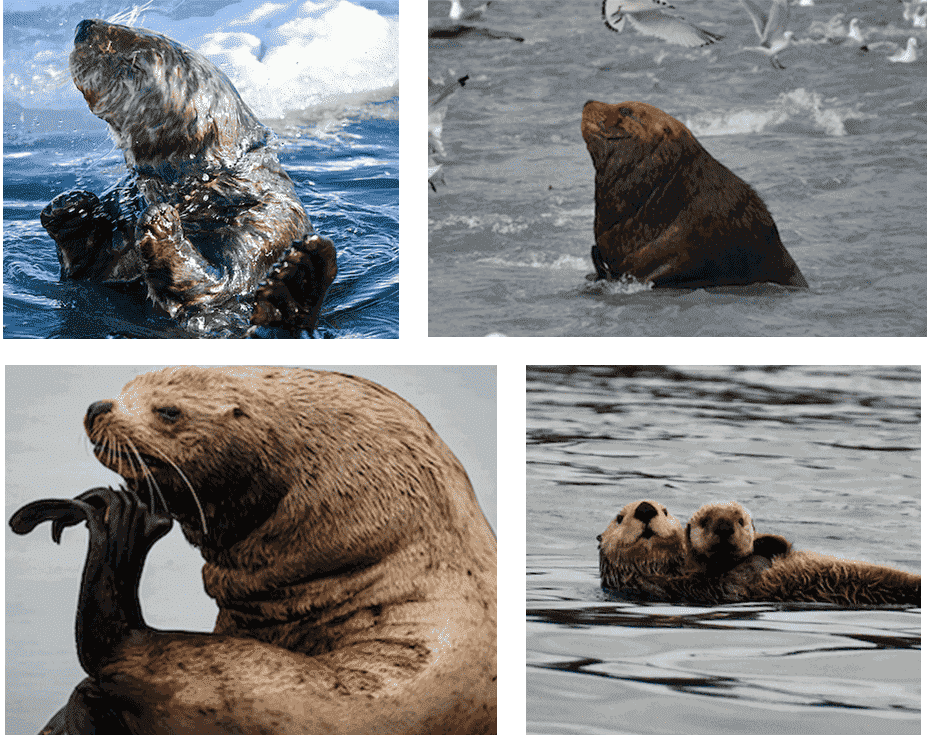
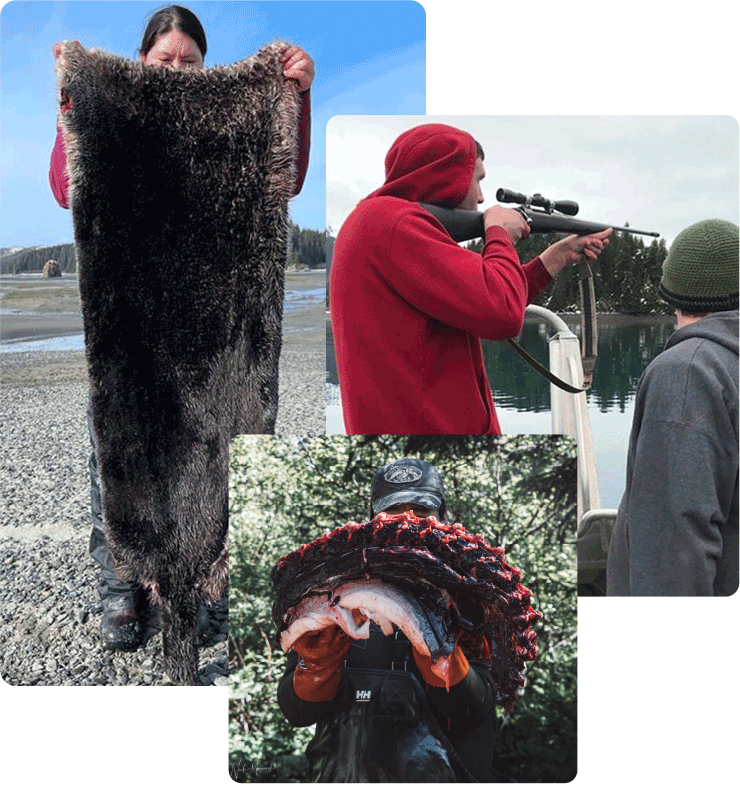
The ocean is the foundation of subsistence for all seven Tribes. Tribal Members have honored and upheld the practice of using marine mammals since time immemorial for food, cultural connectivity, traditional art, and economic development blanketed under the term subsistence. CRRC, on behalf of its seven communities, is working toward assuming the responsibility and authority to exercise our Indigenous rights to act as stewards of our traditional territories and resources. Co-management will reaffirm our commitment to respect, conserve, and manage while protecting the hunt, traditional uses, and local marine mammal habitat based on our knowledge and appropriate scientific principles.
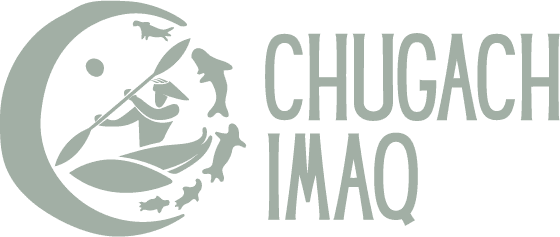
Imaq (E-muh-CK)
Sugt’ stun
The ocean; sea; saltwater, and the contents within it.
The goal of Chugach Imaq is to create a harvest management plan for the Chugach region for the benefit and conservation of marine mammals, which are essential to coastal Alaska Native life. To do so, CRRC is currently studying the health and condition of marine mammals through a bio-sampling program from subsistence-harvested seals that is a reiteration of a previous harbor seal bio-sampling program implemented by the Alaska Native Harbor Seal Commission. CRRC focuses on three subsistence species: harbor seal, sea otter, and Steller sea lion.
Since 2020, CRRC has been working to support a new marine mammal harvest and management strategy that addresses concerns with descendant harvest eligibility and management before the depletion of marine mammal stocks. Under existing MMPA regulations, Alaska Native descendants who have less than a quarter of Alaska Native blood quantum cannot legally harvest marine mammals or use marine mammal parts for handicrafts. This issue has tremendous importance in CRRC’s region, as over 60% of the 1,500 Tribal members CRRC represents do not meet this minimum blood quantum requirement to maintain significant cultural ties to marine mammal subsistence hunting and handicrafting. Their inability to continue their subsistence harvest and customary and traditional uses of marine mammals without fear of legal jeopardy runs the risk of diminishing the prevalence of these cultural practices.
CRRC has made significant progress in developing a region-specific marine mammal co-management strategy and conducting scientific research that takes a holistic, ecosystem-wide approach toward understanding marine mammal health and managing the subsistence harvest of marine mammals by CRRC stakeholders. CRRC has been building our capacity to accept, store, and analyze tissue samples of marine mammals. CRRC at our Alutiiq Pride Marine Institute in Seward has built a complete molecular laboratory to store sampled tissues and conduct a myriad of genomic evaluations. We now have the in-house ability with a team of scientists to evaluate and analyze tissues, including testing for zoonotic disease risk to Tribal users from bio-samples.
CRRC has been working towards building meaningful management relationships with our federal partners. Through these relationships, local monitoring and data collection will provide valuable contributions to the scientific understanding of marine mammals and bolster long-term monitoring of coastal ecosystems within the Chugach (South-central) region. Our ancestors have always had their way of managing relationships with marine mammals; they have a place in our ecosystem. There is a delicate balance with today’s laws, and Indigenous voices must be integrated into the management conversations. We cannot manage ecosystems, but we can consider carefully how we act and how our actions affect the rest of the system.
CRRC has established a rigorous standardized bio-sampling program using the well-established Alaska Native Harbor Seal Commission and Aleut Community of St. Paul Island protocols. This bio-sampling program aims to evaluate the relationship of Tribal members who have regular contact with marine mammals through subsistence use and to understand the health of marine mammal populations in the Gulf of Alaska for a management context. With financial support from the NDN Collective, the Alaska Center for Climate Assessment and Policy, and the Marine Mammal Commission, CRRC’s Marine Mammal Program has been working toward answering critical questions posed in Steve Langdon’s 2016 report. View full report here.
In 2023, CRRC’s Tribal Fish & Wildlife Director Raven Cunningham was invited to speak at the U.S. Marine Mammal Commission’s Annual Meeting on November 14-15 in Washington, D.C., focused on national marine mammal science and management issues and celebrating 50 years of the Endangered Species Act and Marine Mammal Protection Act. The Commission works with agency partners to implement these acts, including the National Marine Fisheries Service (NMFS) at the Department of Commerce, and the US Fish and Wildlife Service (FWS) and the US Geological Survey (USGS) at the Department of the Interior. Mrs. Cunningham used this opportunity to share about CRRC’s efforts to participate more actively and broadly in relevant marine mammal research in the Chugach region, especially to give greater attention to Tribal members’ knowledge and observations.
MMPA
Marine Mammal
Protection Act
The MMPA establishes a federal responsibility for managing and conservating marine mammals. Under this statute, the Secretary of the Interior and Secretary of Commerce have management responsibility. Specifically, the Secretary of the Interior, through the U.S. Fish and Wildlife Service (USFWS), protects and manages polar bears, sea and marine otters, and walruses. The National Oceanic and Atmospheric Administration (NOAA) protects and manages whales, dolphins, porpoises, seals, and sea lions.
The Marine Mammal Protection Act Amendments of 1994 (Public Law 103-238) directed many tasks, but essential to CRRC’s work is the federal responsibility to negotiate co-management agreements with Alaska Native organizations. Co-Management under Section 119 of the Marine Mammal Protection Act promotes the full and equal participation of Alaska Natives in decisions affecting the conservation and management of marine mammals used for subsistence. Many excellent examples of co-management agreements under Section 119 throughout the state of Alaska exist. These successes have shown that effective management and conservation through co-management agreements provide intangible benefits gained through active partnerships.
Co-management between Alaska Native organizations (ANOs) and federal agencies has enhanced cooperation, trust, and respect; however, while significant progress has been achieved, much more can be done for ANOs to fully exercise their authority under Section 119. CRRC does not currently have a co-management agreement and does not fall under any jurisdiction from another ANO, but is working tirelessly to create a formalized role of marine mammal management within the Chugach region while collaborating with federal and private partners to develop local management plans, enhance co-management strategies, and conduct surveys that will provide necessary data for all parties.
Indigenous Peoples
Council of Marine
Mammals
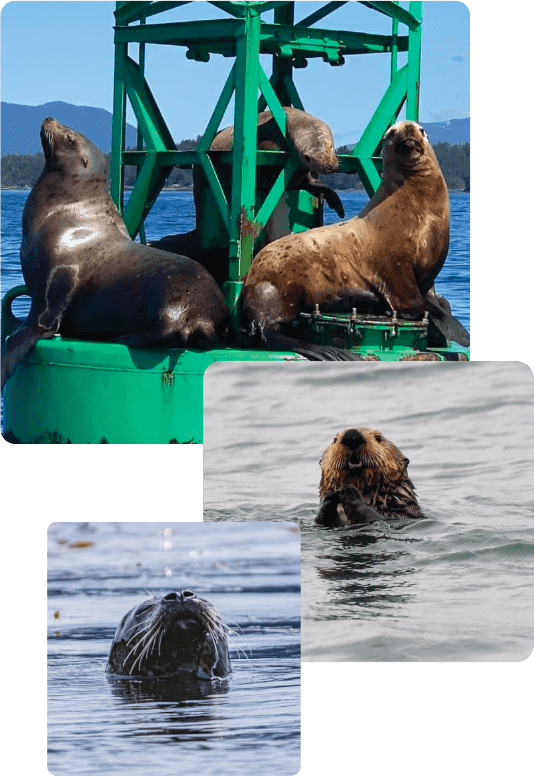
The Indigenous Peoples Council of Marine Mammals (IPCoMM) was formally organized in Anchorage, Alaska, in January 1992 following a Marine Mammal Conference in December 1991 sponsored by the Rural Alaska Community Action Program, where Native leaders identified long-term marine mammal issues.
IPCoMM Priorities:
MMPA reauthorization
Co-management
Applying Traditional Knowledge to the subsistence issue
CRRC is one of 18 ANOs that serve on the IPCoMM. IPCoMM meets twice a year to discuss issues of common concern regarding marine mammal conservation and subsistence.

CRRC's IPCoMM Representative
Raven Cunningham
from Cordova, Alaska
